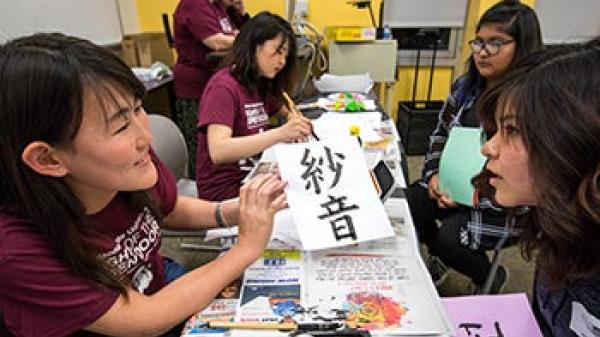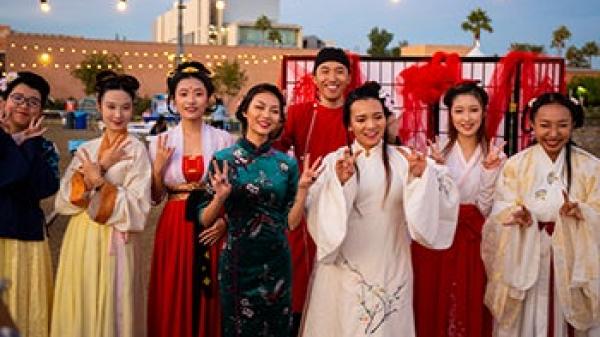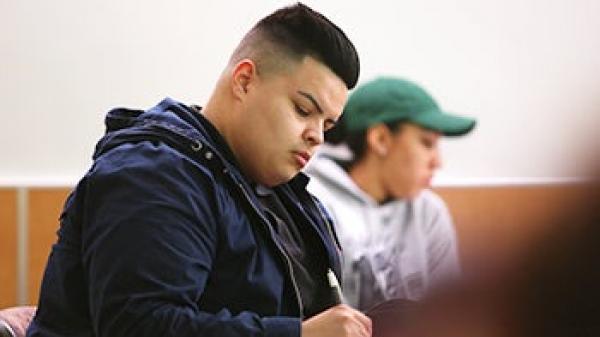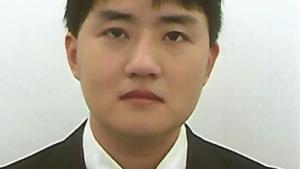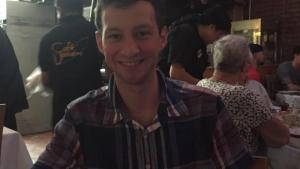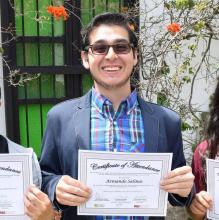Overview
The Japanese program at ASU offers a wide range of courses in language, literature, popular culture, linguistics, and second-language education. Studying the Japanese language and culture at ASU will create countless opportunities for travel, personal enrichment, and professional development, as Japan continues to play a central role in political, cultural, and economic affairs worldwide.
Regardless of your interests or ultimate career plans, there is always a way to use your degree in Japanese studies! Graduates have gone on to exciting careers in:
- international business
- diplomacy
- entertainment
- journalism
- law
- translation and interpretation
- engineering
- teaching (many through the JET Program)
- Other students have entered graduate programs both in the U.S. and Japan.
Even in careers not directly related to Japan, a background in Japanese demonstrates a willingness to confront challenges, sensitivity toward global cultures, and the ability to think critically: skills that are all valued highly by potential employers.
Many of our students study abroad at Japanese universities at some point in their academic career. We believe the experience of study abroad is central to improving your knowledge of Japanese language and culture, and ASU offers a number of programs for the summer, semester, and year, including a faculty-led summer program in Hiroshima. There are many potential sources of financial aid for these programs, and the Office of Study Abroad and your advisors in SILC are all on hand to help you determine which programs are right for you.
Japanese is also popular as a concurrent major, with students connecting their study of Japan to:
- engineering
- computer science
- history
- political science
- economics
- literature
- art history
- religion
- pre-law
- pre-med
Whatever your personal and career interests might be, ASU's Japanese program can help get you there!
Don't forget to visit the SILC Japanese Bulletin for the latest information on events, volunteer opportunities, and available courses.
Degrees
BA Asian Languages (Japanese)
Imagine the new opportunities open to you after studying Japanese. Whether you are interested in foreign service, teaching, international business, diplomacy, science and technology, entertainment or anything in between, knowledge of Japanese takes you to the next level as you expand your network personally and professionally.
Asian Languages/Civilizations (Japanese), MA
This program prepares you for further academic training, entrance into professional schools or work in any career you choose. You will develop an understanding of the Japanese language and culture while working with exceptional professors.
East Asian Languages and Civilization, PhD
Learn how to research with a high level of cultural and linguistic knowledge in this program in which you receive extensive experience in a local vernacular environment and develop the ability to think critically and deal with complex ideas.
Asian Languages (Japanese) (Minor)
Studying Japanese opens the door to a variety of new career paths, new experiences and new opportunities for personal growth and exploration. Regardless of where your interests lie, the Japanese language can help take you where you want to be.
Outreach Programs
ASU offers a number of opportunities to pursue your interest in Japan both on campus and in the Phoenix area. Student organizations such as the
- Japanese Student Association,
- Bridge of Japan-America,
- Anime Weekly,
- the Japanese Media Society,
- and Anime Avalon provide a relaxed setting in which to practice your Japanese and meet other students who share your interests.
Additionally, our faculty maintains close contacts with the Phoenix metropolitan area’s Japanese and Japanese-American communities. You’ll find a variety of avenues to immerse yourself in the Japanese language and culture, including:
- the Japanese Friendship Garden,
- the Annual Arizona Japanese Speech Contest,
- the Japanese Culture Club of Arizona,
- and an annual matsuri (festival) downtown.
Japanese Language & Religion in Hiroshima
- Earn 5 credits in Japanese Language and 2 credits in Japanese Religion and Culture over five weeks while staying at the beautiful Seminar House.
- Includes weekend day trips and one overnight trip to historical cultural sites in and around Hiroshima.
- Applicants just have completed two semesters of Japanese language (or its equivalent) to enroll in JPN 201; and four semesters (or its equivalent) to enroll in JPN 301.
- Applicants must have earned a grade of B- or higher in JPN102 for Second Year Students or JPN202 for Third Year students.
- Hiroshima is also unique in having two UNESCO World Heritage Sites: the Atomic Bomb Dome and the Itsukushima Shrine of Miyajima.
The ability to speak another language opens up more opportunities for scholarships and fellowships. Take a look at our SILC scholarships. ASU also offers an extensive database for you to search through and find the right ones to apply for.
In the Study Abroad Office, Shira Burns oversees applications to programs. Study Abroad’s deadlines for applying for all programs are September 25th for the spring and February 15th for the fall. ASU financial aid is accepted for all programs on Study Abroad’s approved list.
Here is a list of a few scholarships specific for language:
- Fulbright
- Boren
- Benjamin A Gilman International Scholarship
- USAC Study Abroad Scholarship
- Stohl International Undergraduate Research Scholarships
Fellowships and Internships
- U.S. Department of State has a student internships program through Pathways.
- Thomas Perking Undergraduate and Graduate Foreign Affairs Fellowship
- European Union Internships in Europe.
- European Union Internship in the United States.
- Cultural Ambassador Program
People
Faculty
Alumni Stories
Name Daniel Li
Graduation year 2016
Major Japanese
What's your current job?
I'll be starting as an ALT in Japan this September.
How does language and culture help you succeed in your career?
I hope that I can use my context of multiple cultures to teach English as both a language and a tool for understanding culture and diversity. My own studies in Japanese have taught me a lot about my identity as an American and the significance of that from a global perspective.
How did ASU and the language program at SILC prepare you for your future?
The diverse student population at ASU definitely helped bring me out of my shell, so to speak. I've always felt a certain sense of "self-discovery through studying culture" throughout my studies, and I can say with certainty that SILC has helped me grow tremendously as a person.
What was your favorite thing about learning a language?
The feeling of progress that sneaks up you while learning a language never stopped surprising me. Semester after semester, I would look back and realize just how much I had learned in that short time. New languages eventually become a very tangible part of you and experiencing that became extremely motivating.
Any advice for current language studies students?
Never stop your exposure to your language of study. There are so many cultural nuances that embody a language that you just can't learn in a classroom or a textbook. As long as you don't forget your motivation to learn, you'll eventually ease yourself into deeper levels of understanding.
Name Kevin Salter
Graduation year 2016
Major BA in Japanese with a Korean Studies Certificate.
What's your current job?
I work at Authentic Brands Group as the coordinator for the sports brands team. My company is in essence an advertisement agency that happens to hold brands, many of which have retailers in Japan. I communicate with our licensees on a daily basis to ensure that their marketing and brand quality needs are met.
How does language and culture help you succeed in your career?
My company needed someone with language skills to ensure that when a Japanese partner sends us a certificate of insurance they are being transparent about what is insured. I also can check their social media posts against our quality criteria and answer any questions that a Japanese licensee who is not skilled in English may have. Knowing Japanese culture also helps me significantly when explaining decisions that a Japanese licensee has made to my team. More often than not the Japanese style of business differs from how things are done in the USA. Being able to facilitate communications through cultural differences among my peers has been a perk in the workplace.
Did you study abroad? If so, can you speak about your experience?
I studied abroad at Waseda University from 2013 to 2014 (in Japan). It was one of the best years of my life, and I would love to be able to live in Japan again someday. I started out studying as hard as I could, but I actually realized that staying in and studying wasn't helping me as much as talking with my new Japanese friends. I did not do a lot of traveling during my year abroad, which is something that I regret, so if I return to Japan on vacation in the future I think I'll take The Road to The Deep North and explore as much of the country as I can.
How did ASU and the language program at SILC prepare you for your future?
ASU showed me that there should not only be an emphasis on learning vocabulary and grammar but also having a functional understanding of Japanese history, pop culture and traditions is necessary to become truly fluent in the language. I've made a lot more friends in Japan joking about Murakami Haruki books than I have trying to talk about Taylor Swift. Not that I listen to all of her songs all the time or anything like that...
What was your favorite thing about learning a language?
My favorite thing about speaking a second language is being able to make friends with people who I otherwise couldn't. Speaking a second language opens up a door to a whole new world of people.
Name Armando Salinas
Graduation year 2016
Major Mathematics
Minor Japanese
What's your current job?
PhD Student under the AMLSS (Applied Mathematics in the Life and Social Sciences) program, here at ASU.
How does language and culture help you succeed in your career?
Currently, I am starting out as a PhD student in AMLSS. However, I would either like to be a translator or pursue a career in academia in Japan. Language and culture are used all around us, and understanding language and culture will allow us to communicate effectively with the targeted culture. I hope to become fluent in Japanese (as well as become super polite and mannered), that way I can obtain a career in Japan.
Did you study abroad? If so, can you speak about your experience?
I studied abroad at Nanzan University in Nagoya, Japan in the Fall of 2014. I was immersed in the culture (i.e. going to Kabuki, eating Japanese food with my host family, living the Japanese student lifestyle) and my Japanese improved (since they did not speak English). It was arguably one of best moments of time in my life since my dream was to go to Japan. I now have a new dream; to return to Japan.
How did ASU and the language program at SILC prepare you for your future?
ASU, as well as the language program at SILC, gave me the tools necessary to communicate (as well as read) effectively in Japanese. Furthermore, they gave me a “foot in the doorstep” for careers in Japan. This is because Japanese culture heavily values “in-group” and “out-group” statuses, and I am now a part of the Nanzan University “in-group.” So I can use this to my advantage, thanks to ASU, as well as SILC.
What was your favorite thing about learning a language?
My favorite thing about learning a language is learning the framework behind the language. This includes how they construct grammar, as well as what they prioritize. For instance, Japanese culture values harmony. However, this harmony leads to “reading in-between the lines” and indirect comments to avoid conflict in social situations. As a student learning Japanese, I must learn to pick up on these social cues, which I find fascinating. Perhaps, it's better to say that I enjoy language because language invokes culture.
Any advice for current language studies students?
Make sure to think in the languages framework. I say this because not thinking in the language framework leads to direction translations. And if there is one thing I am strongly against, it is direct translations. There is not always a direct translation for phrases (especially idioms) in English to the targeted language.
Thinking in the language's framework promotes creativity and will make learning the language that much easier.


